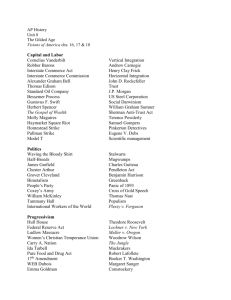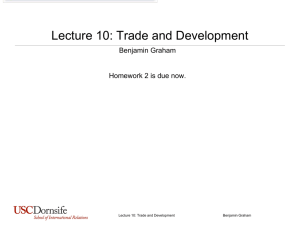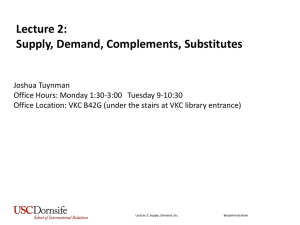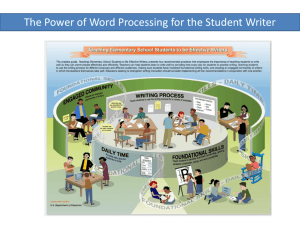Lecture 10: Trade and Development
advertisement
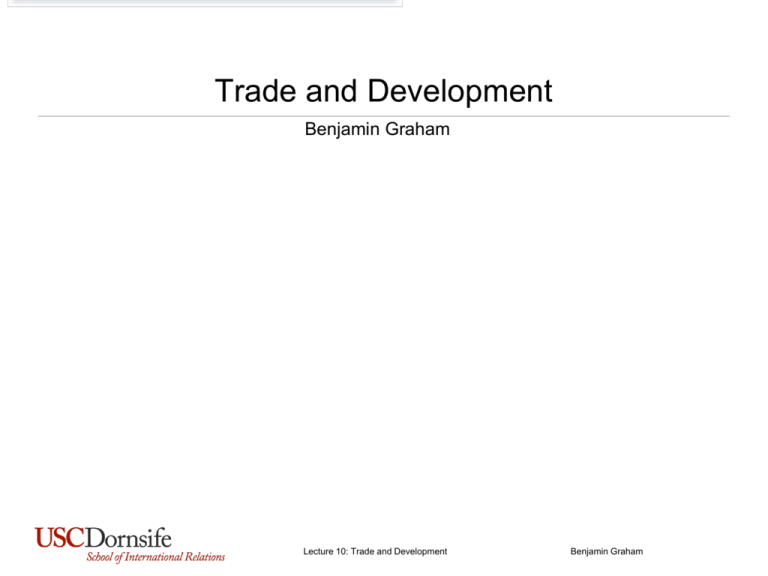
Trade and Development Benjamin Graham Lecture 10: Trade and Development Benjamin Graham Today’s Plan • Reading quiz • Trade and Development Lecture 10: Trade and Development Benjamin Graham Reading Quiz (1) • What kinds of trade problems do developing nations face in seeking to reap the gains from trade? • A. Problems related to having their exports concentrated in only one or a few primary products. • B. Agricultural export subsidies of advanced nations. • C. Tariffs on agricultural products and textiles • D. A and C • E All of the above Lecture 6: Barriers to Trade Benjamin Graham Quiz (2) • Which of the following is not considered a primary product? A. Raw materials B. Fuels C. T-shirts D. Agricultural goods IR 213: Introduction Benjamin Graham Reading Quiz (3) • If advanced nation’s wages are forced down by competition from countries with lower labor costs and abusive labor conditions, this is called • A. Elasticity of Labor • B. Cost and Demand Differences • C. Social dumping • D. Labor subsidization • E. Labor darwinism Lecture 6: Barriers to Trade Benjamin Graham Colonial Legacies • Many of todays poor countries are former colonies • But not all former colonies are poor • It matters who you were colonized by and how you were colonized • Economic institutions • Political institutions • Infrastructure • Human capital Lecture 7: Domestic Politics of Trade Benjamin Graham The Colonial Archetype • Colonial government: • • • Low investment in infrastructure or human capital Produce raw materials (mining, agriculture) Trade exclusively with colonial metropole on unfavorable terms (mercantilism) Lecture 7: Domestic Politics of Trade Benjamin Graham Legacies of Colonialism • Colonies were governed better where the colonists actually resided themselves • Less malaria -> less colonists dying -> more colonists staying • US, Canada, Australia (genocide) and South Africa (Apartheid) • Colonists continued to rule after colonial ties ended. Lecture 7: Domestic Politics of Trade Benjamin Graham If nothing else, hope that you were colonized by the Brits • The Brits hired locals into their civil service • • • • Developed local capacity & human capital When they left, this civil service persisted India is a prominent example: • Hundreds of languages, 30 of which have at least 1 million speakers, several major religions, huge regional economic imbalances • Picture ruling all the Americas as a single country -- only harder Also, the common-law system and English Lecture 7: Domestic Politics of Trade Benjamin Graham If nothing else, hope that you were colonized by the Brits • • • The core questions: Was there investment investment in education and infrastructure? Were there efficient courts, rule of law, etc? • Did the protection of these courts extend to locals, or just colonizers? • Did these institutions survive when the colonizers exited? Lecture 7: Domestic Politics of Trade Benjamin Graham Development after Decolonization • Developing countries export raw materials, import manufactured goods • “Terms of trade” favor rich countries: at the time, raw materials (commodities) were becoming cheaper relative to manufactured goods. • Powerful MNCs often struck deals with poor-country governments that were not good for the developing country. • Decolonization was an economic disappointment Lecture 7: Domestic Politics of Trade Benjamin Graham Development after Decolonization • Neocolonialism • Dependency Theory: • “Core” wealthy states enrich themselves at the expense of “peripheral” states • International division of labor with unskilled labor at the periphery and skilled labor at the core • Peripheral states cannot develop due to their place in the “World System” • System is static and peripheral states cannot join the core • Poverty at the periphery is necessary to sustain wealth at the core • Recommendation: Poor states should withdraw from the global economy • Import-substituting industrialization (ISI) Lecture 7: Domestic Politics of Trade Benjamin Graham Review • Why were you better off being colonized by the British? • A. Have you seen King Leopold’s Ghost? • B. The brits trained locals to serve in the civil service (i.e. the bureaucracy) • C. The common law system has historically better for business because it adapts better over time. • D. English is a convenient second language in the global economy • E. All of the above Lecture 7: Domestic Politics of Trade Benjamin Graham Review • Economic development following decolonization was, generally speaking: • A. A disaster – way below expectations • B. A welcome respite after colonial oppression • C. A runaway success Lecture 7: Domestic Politics of Trade Benjamin Graham Dependency Theory over Time • Dependency theory is Marxist in origin • Like Marxism more generally, it provided a compelling explanation for a set of facts at one time • But made bad predictions going forward • Empirical problems for dependency theory • Peripheral states can grow wealthy (and have) • The poor countries that have developed most successfully have been primarily trade-dependent • Import-substituting industrialization failed (by most measures) Lecture 7: Domestic Politics of Trade Benjamin Graham Import-Substituting Industrialization • Core prescriptions: • • • Tax agriculture and subsidize key industries Protect those industries with high tariffs Aim for economic self-sufficiency (i.e. autarky) • Rapid industrialization: By 1970s many developing countries are self-sufficient in manufacturing • Costs: • • • These industries are inefficient, produce low quality goods Temporary subsidies become permanent No gains from trade!!!! Lecture 7: Domestic Politics of Trade Benjamin Graham Export-Oriented Industrialization • Similar in many ways to ISI: • Tax agriculture (also keep wages low), subsidize key industries • But subsidize exports in particular • “National Champions” model • South Korea is the archetypical case • Cheap labor provides the key competitive advantage • Government investment helps develop higher value-added industries. • But government intervention has its risks... Lecture 7: Domestic Politics of Trade Benjamin Graham Checking Understanding • In import substituting industrialization and export oriented industrialization, who gets taxed to fund government subsidies of selected industries? • A. Other industries • B. Farmers • C. Banks • D. Industrial workers via an income tax • E. Sales tax on consumer goods Lecture 7: Domestic Politics of Trade Benjamin Graham Checking Understanding • What is the core advantage of export-oriented industrialization over import substituting industrialization • A. ISI involves the government picking winners, leading to corruption. In EOI the government doesn’t pick winners. • B. In ISI subsidies intended to be temporary can become permanent. This can’t happen in EOI • C. In ISI, states give up most of the gains from trade. EOI is all about maximizing the gains from trade. Lecture 7: Domestic Politics of Trade Benjamin Graham ISI didn’t die easily • Theories don’t die just because the facts become inconvenient • Entrenched domestic political interests • The 1980s debt crisis sealed the deal • The IMF essentially forced countries off of ISI • Conditional loans: • We’ll bail you out, but only if you adopt the policies we prescribe Lecture 7: Domestic Politics of Trade Benjamin Graham The Washington Consensus • Neoliberal economic policy • Liberalize trade • Privatize state-owned assets • Fiscal austerity to fix current account deficits • Open up to foreign capital and foreign investment • Turns out, this hurts a lot • Taking away the government safety-net in poor countries has high human costs • “bitter medicine” that may not even work • Economic pain = political instability Lecture 7: Domestic Politics of Trade Benjamin Graham Group Questions • There is a strong empirical finding that people with a college education, and especially people with a graduate degree, are more likely to support free trade. Why do you think this is? Lecture 7: Domestic Politics of Trade Benjamin Graham No One Has Time • Take the complex and render it simple • Any fool can do the reverse • Be brief • Write long drafts and cut them back • Never use two words where you can use one • Organization is king • Facilitate skimming • You work hard as a writer to make reading easy • The more complex the ideas, the simpler the prose Lecture 16: Paper Writing Workshop Benjamin Graham How to facilitate skimming • There are 2 jobs: • 1. Articulate your argument • 2. Provide the evidence to back it up • Skimmable means the reader can understand the argument easily while reading only intro paragraph and topic sentences • If they want evidence for a given point, they know what paragraph to read Lecture 16: Paper Writing Workshop Benjamin Graham How to facilitate skimming (2) • Clear thesis statement • Introduction as roadmap • Topic sentences that make the point of the paragraph • Evidence should be where I expect it • In longer papers, subject headings and subheadings are crucial • May be needed even in a paper this short Lecture 16: Paper Writing Workshop Benjamin Graham Writing a good intro to a short paper • If necessary, BRIEFLY provide the reader the relevant facts re: the topic • AVOID generalities and broad statements. Get to the thesis quickly. • Deliver the thesis statement • BRIEFLY and SIMPLY give the main points you will use to back up your thesis • Each of these points will get its own paragraph/section in the body Lecture 16: Paper Writing Workshop Benjamin Graham Writing good body paragraphs • One paragraph = 1 new idea • relates back to the thesis statement • 1/2 a page max (3-6 sentences) • Topic sentence identifies the new idea, • and starts to do the work of the paragraph • Sound reasoning, detailed and specific evidence round out the remaining sentences • Final sentence ties the evidence back to the thesis statement • Only sometimes necessary -- may already be obvious Lecture 16: Paper Writing Workshop Benjamin Graham The Conclusion • In longer papers, it is necessary to re-summarize the whole paper • In short papers, this can be redundant • However, it can still be good to restate the thesis • In some types of writing, the intro provides the motivation, or the puzzle • Tells the reader why he/she should be interested • This can sometimes be taken for granted • You can use your conclusion to: • give broader implications • speculate about extensions of the argument • relate your argument to other ideas/debates Lecture 16: Paper Writing Workshop Benjamin Graham

